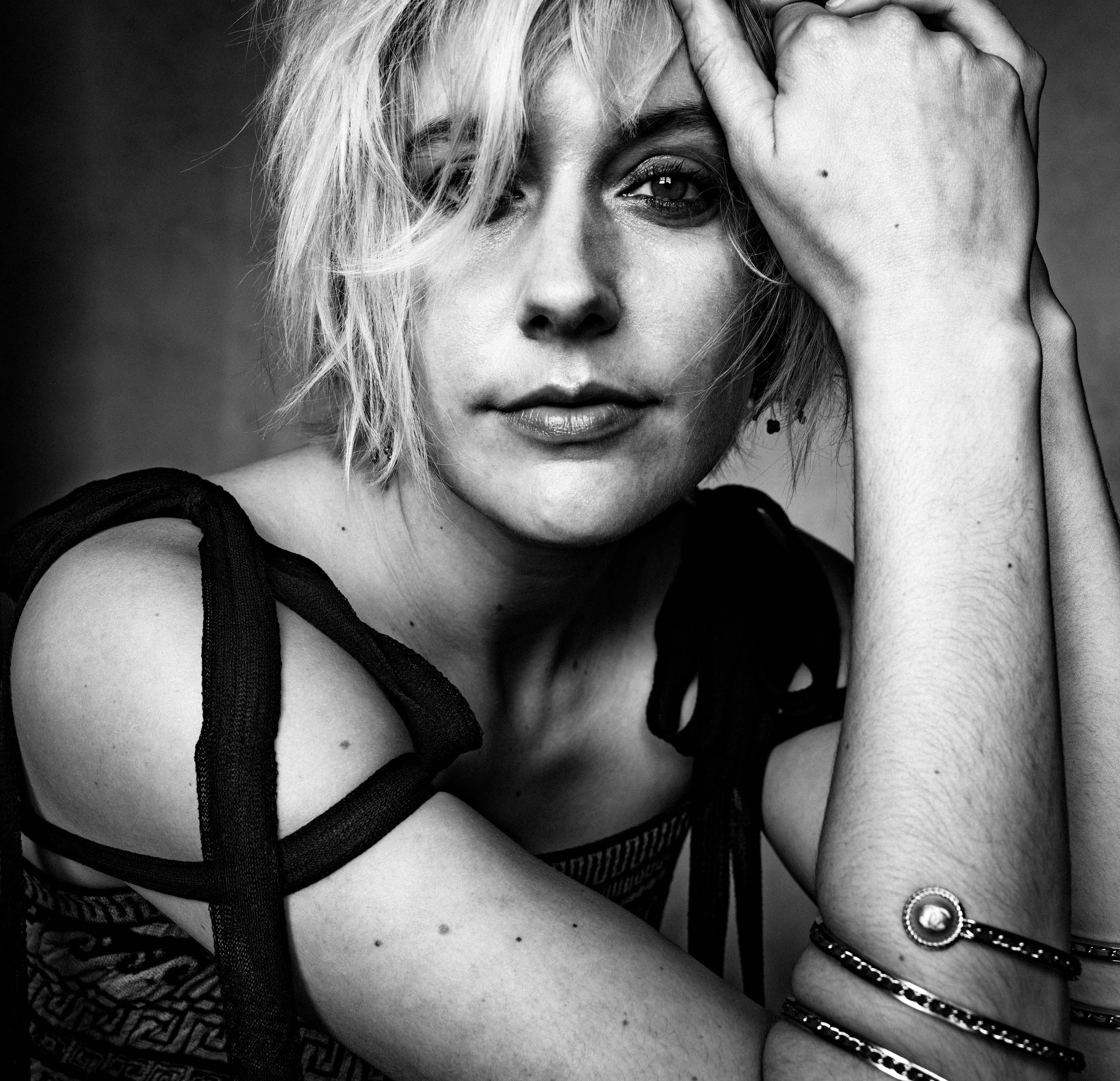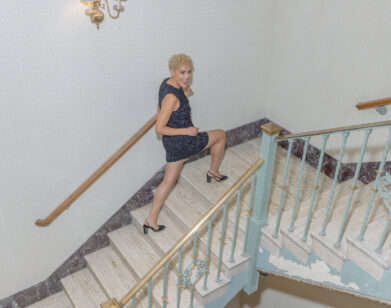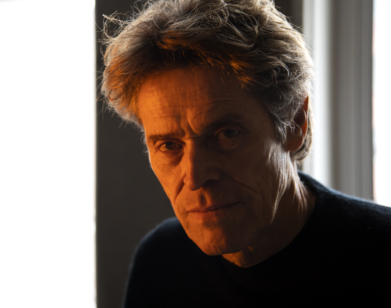America’s alt-sweetheart Greta Gerwig talks to cinema legend Francis Ford Coppola
A decade has passed since Greta Gerwig first lit up the hazy, lo-fi world of “mumblecore” with her seemingly unrehearsed screen presence. In each of her characters, the actress has managed to embody all the messy, knotty complexities of human nature, stumbling and bumbling—and dancing—her way through life and love. Even as Gerwig’s star power has increased, taking her from microbudget, largely improvised indies to bigger movies by auteurs such as Woody Allen (To Rome With Love, 2012), Whit Stillman (Damsels in Distress, 2012), and Mike Mills (20th Century Women, 2016), the 34-year-old New Yorker continues to carry herself with the exquisite naturalism that characterized her early roles. Nowhere has she appeared more charmingly warts-and-all than in her collaborations with her now-partner Noah Baumbach, who directed her in 2010’s Greenberg, then again in 2013’s Frances Ha and 2015’s Mistress America (the latter two she also co-wrote).
At this point, Gerwig has worn just about every hat on a film set (she even held a boom mic back in the day), but she had never directed until now. Her first feature, Lady Bird, loosely based on her own upbringing in Sacramento, follows the defiant and restless title character (Saoirse Ronan) during her senior year of high school, as she rebels against the confines of her family and her city. To celebrate her impressive foray into filmmaking, the newly minted director hopped on the phone with an old pro—the six-time Academy Award–winning legend Francis Ford Coppola—for a conversation about, among other things, Sam Shepard and Santa Claus.
———
GRETA GERWIG: I feel like all I want to do is ask you questions, but I’ll try to make this about both of us. Are you in Napa right now?
FRANCIS FORD COPPOLA: Yes, it’s morning here. I’m watching a beautiful sunrise.
GERWIG: I’m back in New York City. I’m outside and I’m walking, because I tend to think better when I’m walking.
COPPOLA: Let’s start at the beginning: When did you stop believing in Santa Claus?
GERWIG: I got an easel for Christmas—I think I was 7 or 8—and the easel had “Merry Christmas” written on it in all these different colors, and I recognized my mother’s handwriting. I said, “That’s not from Santa Claus. I know that’s your handwriting.” And then I proceeded to do a dance around the living room saying, “I figured it out, I figured it out.” And while I was doing that, I started weeping because I thought that meant there was no more magic in the world. That story actually says a lot about who I am now. I get this pleasure in figuring things out, and then it turns into complete despair.
COPPOLA: Did they own up to it when you discovered the truth?
GERWIG: They did, because they thought I enjoyed it and didn’t realize I was going to turn so quickly. I had a similar thing with movies. I thought movies were handed down by God. I knew that theater was made by people because I saw the people in front of me, but movies seemed like they were delivered, wholly made, from Zeus’s head or something.
COPPOLA: I felt the same way. I remember seeing Rebel Without a Cause, and seeing the credits, and I couldn’t fathom how all those people had gone into making that film. Years later, I got a job at a studio re-editing a nudie film [The Bellboy and the Playgirls, 1962], and I added “Directed by Francis Ford Coppola,” just because I couldn’t believe you could actually put credits on it. Of course, those pictures with my name on it—which were bogus—have followed me all my life. [laughs] The beauty of your movie—and what I love about all films—is that people are totally different and unique. And when they make films that are personal to them, you come away with a sense of knowing them—even though, I’m sure, there’s lots of fiction mixed in with yours. As a kid, were you a big reader?
GERWIG: Yes. Books and theater were the way I understood the world, and also the way I organized my sense of morality, of how to live a good life. I would read all night. My mom would come into my room and tell me I had to go to sleep, so I would hide books under my bed. At first I had a tough time getting through novels, so I read plays, because a play is generally shorter and has all those tools for getting people hooked early on.
COPPOLA: What was the first play you can remember reading?
GERWIG: I remember reading a lot of Eugene O’Neill and Arthur Miller, and being so impressed by Miller’s stage directions. He included very detailed descriptions of how the set is supposed to look, and that allowed me to be inside the plays even if there wasn’t a production going on. In terms of sheer pleasure, Tom Stoppard was very big for me because he is so funny and so smart, and it felt delicious reading him. I got it in my head that there was no way I could ever make plays because you would have to be so incredibly smart, and I was not going to be as smart as those people.
COPPOLA: You said something to me in a previous conversation that I thought was very smart—and it’s something I’ve done in my work as well. You said you deliberately—both as an actor and later in your writing and directing—put yourself in a position where accidents are going to happen. Because when you’re dealing with shaky ground, that’s a moment of truth, and whatever happens is probably going to be really honest.
GERWIG: I think being attracted to mistakes is one of the things that film can capture in a way that theater can’t. Film can capture a moment of spontaneous life that will never be captured again. I like a lot of structure and a lot of lines, but then within that I make room for things to happen that you couldn’t have predicted.
COPPOLA: When you made Lady Bird, did you have any time to rehearse before shooting?
GERWIG: Yes. I cast it pretty early, so before we were even in the official rehearsal period, people came to my house and I worked with two or three actors at a time on the scenes. It wasn’t just working with the lines; it was also a lot of talking and investigation. I would have them all dance together, because when I worked with Mike Mills, he had us do that. I found it useful because it makes you less embarrassed of your body and less embarrassed in front of other people, so I stole that from him. And then we had a couple of weeks of more intense rehearsals before we started shooting. I wanted there to be this core of love and understanding with each other that we could work from. It needed to feel like a communal experience, not an individual one.
COPPOLA: I’ve never made a film where I didn’t request two weeks of rehearsal, but I rarely got it. I would get one week.
GERWIG: I also wanted it to feel like every single character in the film mattered, even the ones who only had a couple of scenes. So I had at least one conversation with everyone, where we would talk, and they would give me their ideas, and we’d build something that had a backstory, so that nothing felt sketched. Everything felt full.
COPPOLA: You did a good job, because I still think about so many of the smaller parts in your film. I loved Tracy Letts’s character, the father. Even though it was only one small part of the meal, you knew the whole meal was there.
GERWIG: In a way, I was influenced by the British director Mike Leigh. He often has characters who come in for a very brief amount of time and you don’t know completely what’s going on with them, but you get a sense of a whole human there.
COPPOLA: Well, Mike Leigh will rehearse for eight months.
GERWIG: I know. [laughs] I wish I could rehearse for eight months.
COPPOLA: What was it like making the transition from your early films—when you were practically in college—to these more established ones?
GERWIG: I wanted to be a playwright in college. That’s what I was interested in and that’s what I was moving toward, and then I had the very lucky accident of falling in love with film. Like we were saying, it wasn’t until I was 19 or 20 that I realized films are made by people, and I had the good luck of suddenly meeting them. Shooting digitally became cheaper and better. Editing became something you could do at home. You couldn’t make something that looked like a Hollywood film, but you could make something through which you could work out ideas. I was acting, but I was also conceiving the plots and operating the camera when I wasn’t onscreen or holding the boom and sitting there at night looking at how it would be edited together. In a way, I got very unvain about film acting, and it became a sort of graduate school for me. At the same time, I was busy getting rejected from every real graduate school I wanted to go to for playwriting. [laughs] Before you start a film, do you begin with an image or an idea or words?
COPPOLA: It’s usually a hunch—something that I know or feel, but that if I were pressed, I wouldn’t be able to exactly explain. When I go to sleep at night, even if I’m not thinking about it, it’s being worked on. So the next time I take the hunch out and look at it, it’s a little further along and sometimes far enough along that I can write a paragraph about it, and then two. It’s sort of like a developing embryo.
GERWIG: I’ve found that if I can explain it to someone early, it’s going to be terrible. You have to give the hunch time to grow in the dark, because otherwise—let’s say you pitch it to a friend really early—it dies.
COPPOLA: It’s like quantum physics.
GERWIG: The same applies to shooting—I didn’t have any playback on my set. I hate when people need to watch playbacks immediately after watching the performance the actors just gave seconds before.
COPPOLA: That’s like a writer reading over what he wrote that day. You don’t want to do that. It’s not as if it makes sense until you get to the end anyway. What I do—and what I tell my kids and my grandkids who are all making films now—is never read what you’re writing. Do the six pages or whatever and turn them over, and in your heart hope that they’re good. But if you read them, you won’t like them and you’ll go back and rewrite and never get to the end.
GERWIG: Our Town was one of the things I thought about when I was writing the Lady Bird script. I had seen a production in New York directed by David Cromer, and it was done very simply and almost seemed like it wasn’t being acted. Everybody was dressed in street clothes, and then at the very end, when Emily reflects on her life, they pull back this curtain, and there was this completely realistic stage set, and there was actual bacon being cooked onstage, and they were in period costumes, and suddenly everything that had been so simple was there vividly living in front of you. I thought, “I want to figure out how to get a piece of that into what I’m trying to do.” In one of the very first scenes I wrote for the film, someone says to Lady Bird, “Where are you from?” And she says, “Sacramento,” but they mishear her and say, “Excuse me, where?” And so she says, “San Francisco.” I thought, “How do I reverse engineer a movie where, when she does that, you feel that ache of a place you can’t go back to?”
COPPOLA: Your film definitely has that.
GERWIG: I love Sacramento, but in a way that I couldn’t see when I was that age. I think when you’re a teenager, you always feel as if life is happening somewhere else—it certainly isn’t happening to you. And then you get to the place where you think your life is supposed to be, and you look around and realize it doesn’t exist.
COPPOLA: I felt that way when I lived on Long Island. I wanted so badly to live in New Orleans. And then years later I did go to the French Quarter—it’s a wonderful place to visit—and I thought that I was going to write plays and have a girlfriend and all of the things that I wasn’t having, but I didn’t.
GERWIG: I once went through a major Sam Shepard phase, and I thought, “I’m completely in the wrong place, and I’m the wrong gender! And I’m also not a heavy drinker! And I need to somehow become a wild man and go out to the West and learn how to rope cattle!”
COPPOLA: I don’t think Sam Shepard knew how to rope cattle.
GERWIG: Well, he seemed like he did! I think the problem with growing up and idealizing self-destructive artists is that you only see the beauty they created rather than all the pain that went along with it. But then I read Joan Didion, and it was the first time I’d read something by an artist—a great artist—who was working in the same place I was from and writing about it, and it was the first inkling I had that maybe I didn’t need to be a different person in order to make something that was worth anything.
COPPOLA: That’s what your film is about, isn’t it?
GERWIG: I guess it’s a revelation I’m still dealing with.







